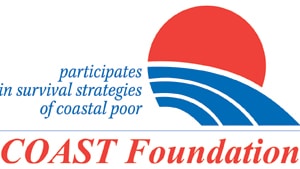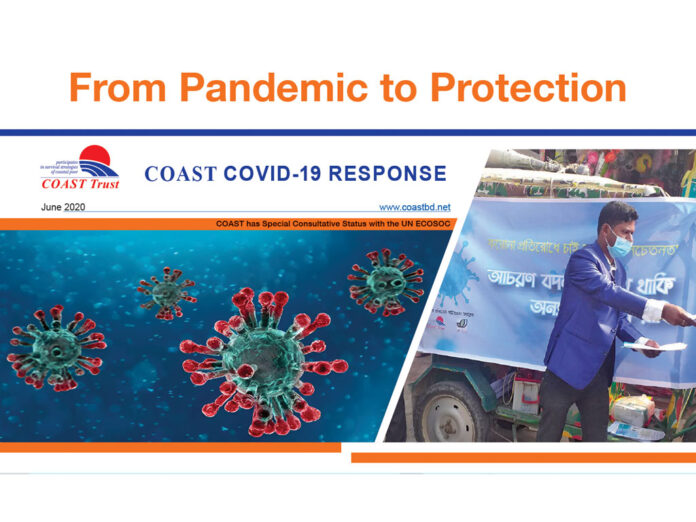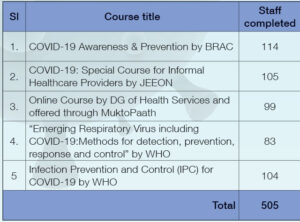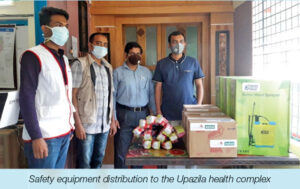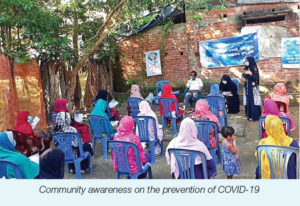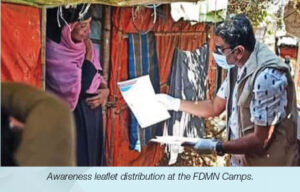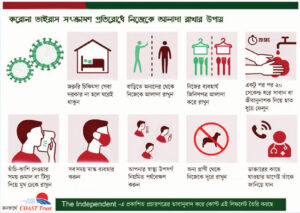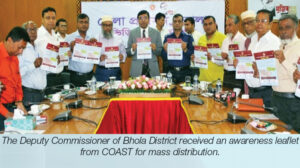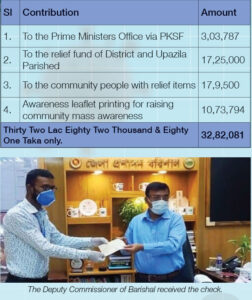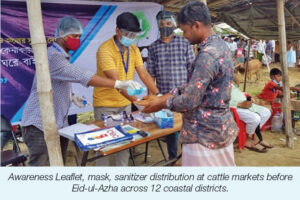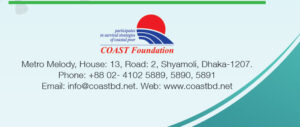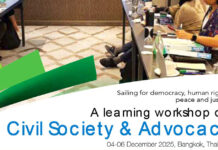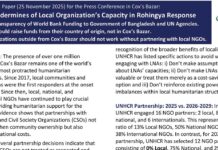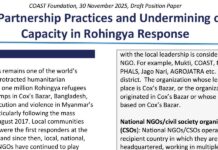Introduction
The COVID-19 pandemic profoundly impacted Bangladesh, affecting public health, livelihoods, and the overall economy. Beginning in early 2020, the virus spread rapidly, leading to lockdowns, disruptions in essential services, and immense pressure on the healthcare system. The first confirmed case of COVID-19 in Bangladesh was reported on 8 March 2020 by the Institute of Epidemiology, Disease Control and Research (IEDCR). According to the Directorate General of Health Services (DGHS), as of the end of 2023, Bangladesh recorded over 2 million confirmed COVID-19 cases, with approximately 29,500 deaths attributed to the virus. Vulnerable groups such as women, children, persons with disabilities, and low-income families were disproportionately affected. Education, mental health, and food security also faced serious setbacks.
COAST Response:
Staff Safety and Preparedness
COAST Foundation (then COAST Trust) prioritized the protection of its staff by providing training on COVID-19 protocols. They also received different online training from the organizations, like WHO, the Health Department, etc. Focal persons were assigned at the regional and central levels to monitor cases and provide necessary support to the staff and their families. Offices were equipped with disinfection tools, temperature checks, and mandatory daily reporting protocols. Every office head had to report to the focal person every day if any COVID-19 symptom or cases was found.
Mandatory COVID-19 Certification course for Staff
During the pandemic, COAST made it mandatory for all staff to complete at least five basic COVID-19 prevention courses offered by the World Health Organization (WHO) and Muktopaath (https://muktopaath.gov.bd), a government platform. These courses—such as Coronavirus Diseases (COVID-19), COVID-19 Awareness and Prevention, and COVID-19: Special Course for Healthcare Providers—were essential for ensuring proper understanding and safe practices. Staff were required to submit course certificates to the HR department to continue receiving their monthly salaries.
Equipment and logistical support for staff
COAST management organized over 100 regular Zoom meetings to raise staff awareness about COVID-19 risks and protection measures. Designated focal persons monitored and reported field-level cases for timely action.
All offices were supplied with protective equipment and materials, such as tissues, lid-bins, gloves, masks, oximeters, oxygen cylinders, and hand sanitizers, free of cost. Daily temperature checks and strict adherence to a COVID-19 Code of Conduct were also ensured across all offices.
Community awareness and safety program
From the onset of COVID-19 in March 2020, COAST launched an extensive community awareness campaign. Activities included video awareness messages, social media posts, leaflet distribution, miking, and regular follow-ups during home visits. COAST produced and distributed 450,000 awareness leaflets across families, schools, and religious institutions in coastal areas, reaching over 8.5 million people. Additionally, 150,000 leaflets in Burmese were distributed across 37 Rohingya camps and 77 mosques, reaching 350,000 Rohingya people through group discussions. Six awareness videos in Bangla, Burmese, and Chittagonian were shared via the COAST Facebook page (https://www.facebook.com/coastbd/) and YouTube channel (https://www.youtube.com/channel/UCs7YIY6mf6JBJzML8h33MjQ). All materials, including awareness leaflets, are accessible at COAST website (www.coastbd.net).
Got Second Life through the Organization’s Support
A COVID Survivor’s Story with COAST
I am Zahangir Alam. I have been working with COAST Foundation for the past fifteen years, and currently, I serve as the Regional Team Leader of the organization. I was born in a remote village of Teknaf Upazila. I am married and a father of three daughters.
During the COVID-19 pandemic in 2020, I carried out various awareness activities on behalf of the organization, including distribution of leaflets in the community, especially in the Rohingya camps. From July 18th to July 20th, 2020, I distributed leaflets for three consecutive days in the Rohingya camps.”
On 21 July 2020, while I was preparing to go to the office, I suddenly felt a severe headache and fever of 102°F, and a strong cough. I rested at home for three consecutive days. It is worth mentioning that during the pandemic, the organization had appointed three experienced doctors who provided online consultations and prescribed medication for the employees. Following this process, I was taking medication after consulting with Dr. Abidur Reza Chowdhury online, a consultant of COAST Foundation. However, as the cough did not subside, both my family and I were concerned, especially with the fever reaching 102-103°F.
On the other hand, the Executive Director of COAST Foundation, Mr. Rezaul Karim Chowdhury, was tirelessly trying to secure a hospital bed for me throughout the night, contacting hospitals in Chattogram and Dhaka. Despite his persistent efforts, no bed was found available. Finally, with the help of a high-up from the then government, the Executive Director managed to secure a bed for me at the Surgiscop Hospital in Chattogram. At that time, finding a bed meant finding a life.
The next morning, the Cox’s Bazar District Hospital discharged me. I set off to the hospital in Chattogram in an ambulance, still at a life-and-death juncture. The oxygen I was receiving in the ambulance was far less than what I needed.
After a long four-hour journey, I finally reached the Surgiscope Hospital in Chattogram. I was carefully transferred from the ambulance to a wheelchair with an oxygen mask. Seeing five colleagues from the organization standing there, I felt a sense of relief.
I spent five continuous days at the Surgiscop Hospital. There was no opportunity to use the washroom without the oxygen mask. I was in the ICU (CCU), and every night, I would hear the sound of dead bodies being packed in bags. The air would grow heavy with the cries of relatives. Every day, the Executive Director would call to check on me.
After five long days of treatment, I returned to Cox’s Bazar on the doctor’s advice. My body felt extremely weak, and I could hardly walk. The injections and medications administered to me were unbearable, and my hair had almost fallen out. After returning from the hospital, it took me about a month to recover. As far as I know, the treatment at the private hospital in Chattogram costs around five lakh taka. During my time in the hospital, the financial assistance and mental support I received from the organization gave me a new life. I will be ever grateful to all my colleagues and the organization.
Vaccination support for the community
At the beginning of the COVID-19 vaccination rollout, many community members were hesitant to register. To address this, COAST launched mobilization campaigns to raise awareness and encourage vaccination for people. The organization also set up registration booths at its offices to assist community members in signing up and accessing the vaccine. That helped a lot to the community, especially for those who did not access to the internet and devices.
Community Radio as a Tool for Mass Awareness
COAST operates two community radio stations in Bhola and Cox’s Bazar, which played a vital role in spreading COVID-19 awareness messages. These stations broadcast the government’s administrative and IEDCR messages on safety measures, lockdown guidelines, health precautions, etc. They also hosted health professionals in “Phone-in Live” programs and awareness shows to educate the public on isolation, hygiene, and prevention practices, helping communities stay informed and safe in their daily lives.
Key Awareness Messages in Leaflets for Mass Campaign
COAST produced awareness leaflets focused on themes from the World Health Organization, icddr,b, and the Bangladesh Department of Health. Topics included mental stress relief, COVID-19 prevention, home quarantine guidelines, legal consequences of violating quarantine, breathing exercises, monitoring blood oxygen levels, and proper face mask usage. These messages aimed to educate the public and promote safe practices during the pandemic.
COAST Provided 100% Free COVID-19 Treatment for Staff and Family
COAST promptly ensured full financial support for COVID-19 testing and treatment for all staff and their families. The organization covered 100% of the medical expenses, including all logistical arrangements, to ease mental stress and ensure well-being. This initiative reflected COAST’s strong commitment to protecting its workforce while raising awareness to help them stay safe during the pandemic.
Coordination with Government and Health Authorities
COAST actively collaborated with local government administrations, the Department of Health Services, and other stakeholders to strengthen the COVID-19 response. It promoted public awareness and safe practices— such as mask usage, hand hygiene, and social distancing— through local engagement. Additionally, COAST distributed PPE, nebulizers, and sanitizing supplies to health complexes in Charfession, Monpura, and Kutubdia Upazila.
Contribution to the Government Coronavirus Welfare Fund
On 30 and 31st March 2020, COAST distributed US$19,000.00 to 8 coastal districts and 47 sub-districts in the government-created Coronavirus welfare fund. Considering the situation, since March 10, other activities have been undertaken in 9 coastal districts in the organization’s working areas. The amount was paid to the government account to support the poor and marginalised coastal community people who were affected by the lockdown and thereby had no work, income, etc.
Humanitarian assistance
After the government announced the countrywide lockdown, daily wage earners were disproportionately affected, as they were among the first to lose their jobs. To stand with the affected people, COAST provided support to 3,200 families in all unions of Cox’s Bazar. These families received clean water storage jars, hand soaps and laundry soaps. Additionally, COAST distributed five kilograms of rice to 1,600 families in Ukhiya Upazila. Sentmartin, a remote island located nine kilometers away from the upazila’s mainland, was also a beneficiary of the organization.
Study on the COVID-19 lockdown and its impact on livelihoods for support and advocacy
COAST research wing immediately commissioned a study on the lockdown and its impact on livelihoods in April-May 2020 and shared the findings with the government departments, INGOs and NGOs, etc. by publishing the research findings in the national dailies so that agencies, that are involved in the COVID-19 response, can get the insights of impact and livelihoods, and also can support to address the challenges. The major findings were:
- During that period, about 63% of coastal poor households had borrowed loans at high-interest rates from local moneylenders due to a lack of institutional credit facilities.
- 48% of households had broken down their savings in response to the crisis caused by the lockdown. 35% of the families sold their cows and goats.
- The survey also found that 57% of households were in the food crisis because of the lockdown.
- About 46% of households experienced increased violence against women.
- About 56% of families used to eat regular protein, i.e., fish, meat, or eggs 3-4 days a week, which came down to 13% because of the lockdown. 87% of households then consumed such protein 1-2 days a week.
- Because of the lockdown, 34% of households had lost their income completely, income had come down by one-fourth to 39%, and half of the 19% of the respondent families, etc.
The study findings gave a spotlight to the NGOs and other relevant agencies to rethink and reshape their support and packages in addressing the challenges that resulted from the COVID-19 lockdown.
Conclusion
COAST Foundation responded swiftly and comprehensively to the COVID-19 crisis. From staff protection to community awareness and advocacy, the organization stood by its commitment to serve the coastal population. As a trusted local NGO, COAST worked in coordination with the government and other partners to ensure a sustained and inclusive COVID-19 response will always stand beside the community whenever they need.
COAST resources on COVID-19
COVID-19 in Media


